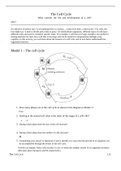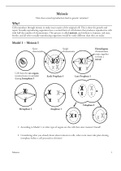Mitosis pogil questions - Study guides, Class notes & Summaries
Looking for the best study guides, study notes and summaries about Mitosis pogil questions? On this page you'll find 16 study documents about Mitosis pogil questions.
Page 2 out of 16 results
Sort by

-
Mitosis POGIL | Questions with 100% Correct Answers | Latest Update | Verified
- Exam (elaborations) • 3 pages • 2023
-
- $10.49
- + learn more
Mitosis POGIL | Questions with 100% Correct Answers | Latest Update | Verified List the four phases in the mitosis process. - Telophase, Metaphase, Prophase, and Anaphase Where is mitosis in the cell cycle (Before and after) - (Before): G1/cytokinesis (After): G2/S(ynthesis) What three phases of the cell cycle are considered interphase? - G1, G2, S How many cells are present at the beginning of mitosis? - one How many cells are present at the end of mitosis? - two How many chromatids are ...

-
AP BIOLOGY POGIL - The Cell Cycle Questions with Answers
- Exam (elaborations) • 13 pages • 2022
-
Available in package deal
-
- $13.99
- + learn more
AP BIOLOGY POGIL - The Cell Cycle The Cell Cycle What controls the life and development of a cell? why? An old piece of poetry says "to everything there is a season... a time to be born, a time to die." For cells, the line might say "a time to divide and a time to grow." In multicellular organisms, different types of cells have different roles and need to complete specific tasks. For example, a cell that isn't large enough is not useful for storing nutrients for later, but a cell that is...
Mitosis POGIL | Questions with 100% Correct Answers | Latest Update | Verified

-
Mitosis POGIL | Questions with 100% Correct Answers | Latest Update | Verified
- Exam (elaborations) • 3 pages • 2024
-
- $12.99
- + learn more
List the four phases in the mitosis process. - Telophase, Metaphase, Prophase, and Anaphase Where is mitosis in the cell cycle (Before and after) - (Before): G1/cytokinesis (After): G2/S(ynthesis) What three phases of the cell cycle are considered interphase? - G1, G2, S How many cells are present at the beginning of mitosis? - one How many cells are present at the end of mitosis? - two How many chromatids are in each replicated chromosome? - two sister chromatids How many replicated chrom...

-
Mitosis POGIL | Questions with 100% Correct Answers | Latest Update | Verified
- Exam (elaborations) • 3 pages • 2023
-
- $6.49
- + learn more
List the four phases in the mitosis process. - Telophase, Metaphase, Prophase, and Anaphase Where is mitosis in the cell cycle (Before and after) - (Before): G1/cytokinesis (After): G2/S(ynthesis) What three phases of the cell cycle are considered interphase? - G1, G2, S How many cells are present at the beginning of mitosis? - one How many cells are present at the end of mitosis? - two How many chromatids are in each replicated chromosome? - two sister chromatids How many replicated chrom...

-
Meiosi
- Exam (elaborations) • 8 pages • 2022
-
- $7.49
- + learn more
Meiosis 1 Meiosis How does sexual reproduction lead to genetic variation? Why? Cells reproduce through mitosis to make exact copies of the original cell. This is done for growth and repair. Sexually-reproducing organisms have a second form of cell division that produces reproductive cells with half the number of chromosomes. This process is called meiosis, and without it, humans, oak trees, beetles, and all other sexually-reproducing organisms would be vastly different than they are to...

$6.50 for your textbook summary multiplied by 100 fellow students... Do the math: that's a lot of money! Don't be a thief of your own wallet and start uploading yours now. Discover all about earning on Stuvia



